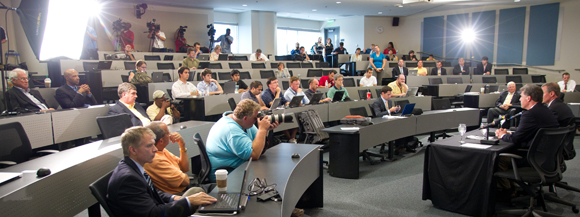Seeking a reduction in the penalties assessed to its athletic program by the NCAA in mid-July for major violations committed by its football and men’s basketball programs, Tech submitted a written appeal to the NCAA on Friday, Sept. 9.
Tech appealed two of the four primary findings listed in the NCAA’s infractions report on the case, expressed an objection to multiple indications by the NCAA Committee on Infractions that Tech officials attempted to obstruct the investigation and requested the reinstatement of the football team’s victory in the 2009 ACC Championship Game.
“Tech takes its compliance obligations very seriously and accepts responsibility for its mistakes. These mistakes, however, were made in good faith while Tech took what it believed to be reasonable and appropriate steps under the circumstances,” the appeal said.
The findings that Tech chose to challenge stemmed from an incident involving impermissible benefits provided to two former Tech football players, wide receiver Demaryius Thomas and safety Morgan Burnett.
Thomas accepted clothing and other items valued at $312 from either his cousin or a friend of his cousin; the confusion over this detail was a major point of contention between Tech and the NCAA and factored into the NCAA’s ultimate conclusions. Burnett was investigated for a similar incident, but the NCAA found that Tech had tampered with the investigation by notifying him about a pending interview with an NCAA official.
In appealing the NCAA’s findings, Tech challenged the assertion of the Committee on Infractions that Tech deliberately manipulated the information presented to both the ACC and the NCAA to justify the decision to keep Thomas eligible. The appeal presented Tech’s rationale for choosing not to declare Thomas ineligible based on the information available at the time.
“While the Committee [on Infractions] ultimately determined over a year later that [Thomas] should have been withheld, when viewed under a ‘real time’ prism, [Tech’s] decision was reasonable,” the appeal said.
Tech denied the allegation that Institute representatives took a “combative” approach when dealing with NCAA investigators. Tech also indicated that Institute President G.P. “Bud” Peterson was never informed of any such issue and therefore had no opportunity to address it.
Separately, Tech requested that the NCAA restore the lone win vacated as a result of the violations—the football team’s 39-34 victory over Clemson in the 2009 ACC Championship Game—on the grounds that such a sanction was not appropriate.
“The Committee [on Infractions] abused its discretion by imposing this penalty. The Appeals Committee has previously identified factors…in determining whether to vacate victories, and vacation is not appropriate in this case,” the appeal said.
Several times within the appeal, the Institute noted that if it had declared Thomas ineligible when the allegations first arose in mid-November 2009, he likely would have been reinstated prior to the ACC Championship Game.
Based on the success rate of previous appeals, Tech’s odds of success are slim. On Jan. 1, 2008, the NCAA instituted new, tougher standards for successful appeals, and since then only one of 13 appeals has been successful.
The only successful appeal was submitted by Alabama State in 2009. The school successfully argued that a five-year probationary period was excessive and had it reduced to a three-year period.
Now that Tech has submitted its written appeal, the Committee on Infractions will have 30 days to submit a response. A final decision will be rendered by the NCAA’s five-person Infractions Appeals Committee following an in-person hearing once all materials are reviewed.
